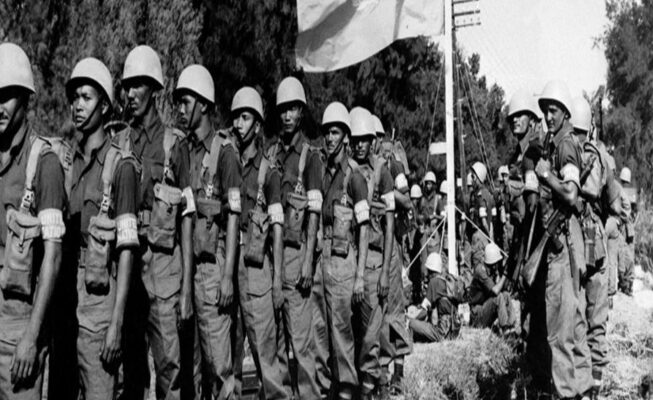In the traditional historiography of the decline of the British Empire, World War II is viewed as the seminal event and for good reason – the old story is basically correct, though Britain would emerge as the victor, it was too tired to continue its role as the dominate power, a role it had since the end of the Napoleonic Wars. Britain had already lost a generation of her finest young men in the Great War, and now, not even 30 years later, she lost another. Britain had no more will or even ability to continue its empire, and it had run out of nations that were “White enough” to be granted “Dominion status,” as she had with Canada and Australia. So deep were the losses of World War II, that Britain lost control of India, the crown jewel of her Empire, shortly after the end of the war.
For a brief time, the United Kingdom tried to continue her empire. Although the World Wars had seriously damaged it, the real beginning of the end for the British Empire, the point at which Britain lost desire to continue, would not occur until over a decade after the end of the Second World War – with the Suez Crisis. It was at this point when Britain was finished as a global superpower. For a quick reminder as to what happened, the Suez Canal was built by the British and was accordingly administered by them, via the Suez Canal Company, even after Britain granted Egypt itself independence. In 1956, Egyptian President Gamal Abdel Nasser nationalized the Suez Canal, prompting an invasion by Israel with the support of Britain and France. However, international pressure began to mount for a withdraw. The USSR was trying to gain a foothold in the Arab world while the United States, fearing a Soviet dominated Middle East by using anti-colonial rhetoric, also pressured for a withdraw. Eventually that withdrawal would come, and while Israel and France were both harmed by the ordeal, Britain was devastated. Shortly after, Britain had lost almost all of its colonial holdings.
A “new” Suez Crisis could be unfolding before our very eyes, and one with the potential to be just as destructive to the status of the United States as a superpower as the Suez Crisis was to Great Britain almost 70 years ago. Currently, Ethiopia is building the Grand Ethiopian Renaissance Dam on the Nile. The purpose of the dam is to supply Ethiopia with an almost endless supply of cheap electricity, but it will come at a very grave cost – the dam will significantly lower the water downriver from it, a water supply Egypt is completely dependent upon. Egypt has asked Ethiopia to reconsider, and even tried to work out some kind of agreement, but Ethiopia has refused to budge. I view three possible scenarios developing from this and will outline each of them here. By no means should these scenarios be considered mutually exclusive, two or even all three could happen. However, all three of them do point to a Second Suez Crisis, one that could significantly damage the role of the United States as a superpower.
World War III: African Edition
The first scenario is fairly straight forward – fearing the literal death of Egypt, the Egyptians, either the Egyptian government acting clandestinely or individual Egyptians acting on their own accord, bomb the dam. At this point, Ethiopia blames Egypt and declares war. This, in and of itself, causes a major crisis as Sudan would likely join in the conflict as well, though which side is unclear. Like Egypt, Sudan is dependent upon the Nile, although not to the same degree; but Sudan it is closer to Ethiopia, mostly out of spite to the United States (a strong ally of Egypt). From here, the conflict could easily become an African-wide conflict – possibly in the form of a Christian versus Muslim religious war. But it gets worse from here – Egypt is an American ally, while Ethiopia is a Chinese ally, meaning the United States and China could be drawn into a war together.
The Egyptian Refugee Crisis
If the dam is built and its impact is as bad for Egypt as many have feared, it will trigger a massive refugee crisis, one that will make the one a decade ago in Syria look minor. This crisis appears to be far more extensive, and the population of Egypt is larger than Syria. Egypt has a population of 102,674,145 compared to the 22,142,061 in Syria. When they attempt to flood Europe, we all know the Arab nations will not be asked to take in the refugees, and Europe will be faced with the sudden death of its civilization as it is overwhelmed with Egyptians. Luckily, the Nationalist Right is stronger now that it was when the Syrian Crisis began; the Nationalist Right was able to make popularity gains thanks to the backlash against the refugees. What this means is that globohomo will apply even more pressure on Europeans, and the power struggle could get ugly. This is in addition to the massive problems caused by another refugee crisis.
A New Egyptian Revolution
The Egyptian elite are utterly oblivious. I know this is true in most of the world, but the Egyptian elite are particularly ignorant. Cairo is one of the most overcrowded cities in the world, and the Egyptian elite are responding to this by building a new capital city for themselves (for now named the New Administrative Capital, “NAC”). The NAC will function as a fanciful playground for the elites, and it will include waterparks in a country that has water shortage issues that are about to get worse. I can easily see this triggering a new Egyptian Revolution. When Mubarak fell in 2011, most observers predicted the Muslim Brotherhood would take over, as they had the best organization of any of the opposition parties. And they did, but Mubarak did do one thing right – he kept the military secular, and they were able to stage a coup. Should another Egyptian Revolution take place, it is unclear that the Muslim Brotherhood, or perhaps another Islamist group, would be prevented from taking power. And this, along with the Taliban victory in Afghanistan, would emphatically show that Islamism is on the rise again.
As I stated before, these are not mutually exclusive. Each of these scenarios could occur, but even all three could happen. Either way, they all point to the same outcome – a Second Suez Crisis. The upheaval that is sure to follow each of these events will almost certainly shut down the Suez Canal and considering how important that is to the global economy, an incredibly catastrophic economic crisis would likely transpire. The Suez Canal was blocked for under a week in 2021 and it resulted in around $9.6 billion in lost trade. A massive war with Ethiopia (especially if it spills over into a wider conflict), a refugee crisis, or an Egyptian civil war could utterly decimate the global economy. And with that, the power status of the American Empire.
There are other, even longer-term outcomes that pose a serious risk to the United States. What emerges in Egypt after this possible crisis will likely be staunchly anti-American sentiment. No matter what happens, this will be decisive proof that the American Empire can no longer protect its allies, or else Ethiopia would have never built the dam in the first place. The fact that Ethiopia even did this means that that have more faith in China than they do the United States. Egyptians would feel like the United States let them down and would no doubt respond by becoming fanatically anti-American. It would be a loss of one of the strongest allies the United States has in the Islamic world.
When Britain lost the Suez, it was the beginning of the end for an empire that once boasted that “the sun never set” on her domains. A Second Suez Crisis could spell the same fate for the American Empire.







I read a few books on the 1956 incident. The relationship between the USA and Britain was strained. The British pound was taking a beating during that episode. The Third World was impressed by the US’s stance at that time. The Brits thought because of WW2 they could count on Ike but that did not happen. Informative article. Thank you.
First, the Suez Canal was built by the French, specifically de Lesseps, who also tried to build the Panama Canal. The English got control of the Suez Canal when they conquered Egypt.
Second, the Grand Ethiopian Renaissance Dam is structurally completed, and it has just finished its third season of partial filling. Filling occurs during the Nile flood, and it will require several more years for completion. The dam is generating electricity.
Egypt might go to war over the dam, but if it does there is no telling how far the war will spread.
We are in a era where major wars are possible, even pending, in Central Europe, the Middle East, East Asia, and Africa. No one seems to be interested in avoiding any of them. They might all occur and merge into one grand conflagration.
Well, if the Suez Canal crisis broke the British Empire then may this looming crisis break the Yankee Empire. What matters the most is how Southern Nationalists react.